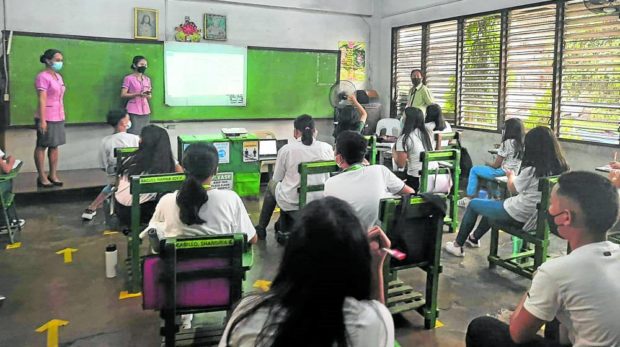
BACK TO CLASSROOMS | Several schools in Cebu City, like Abellana National High School, have been holding limited in-person classes for several months now. (File photo by NESTLE SEMILLA / Inquirer Visayas)
MANILA, Philippines — The Alliance of Concerned Teachers (ACT) called on the Department of Education (DepEd) to “think outside of the K-12 box” as it expressed reservations on the agency’s decision to remove extracurricular activities from the students’ campus life.
The ACT said such a move, reiterated earlier this week by Vice President Sara Duterte, the concurrent education secretary, might prove counterproductive and just lead to “burnout” among students and teachers.
“Extracurricular activities contribute to the learners’ holistic development and provide them different forms of enjoyable activities that also serve as respite from intensive formal academic work,” ACT said in a statement on Tuesday.
During her visit to Don Pedro Vasquez Memorial School in Guimaras province on Aug. 26, Duterte told teachers to focus on academics to catch up on lessons missed or inadequately discussed because of the limitations of distance or blended learning.
“We are here to remind you to focus on the academics of our students … because there is a real difference between having pure online classes and in-person classes,” she said.
DepEd’s priority, she said, is the students’ academic development, hence some traditional activities—like the Palarong Pambansa (national sports meet)—will not push through this year.
“We will release a department order that would detail what co-curricular and academic activities are allowed to be conducted this year. We are prohibiting extracurricular activities,” Duterte said.
But for ACT, DepEd under Duterte is showing its “fixation with achieving the too cumbersome competency list of the K-12 curriculum and the narrow framework that loss in learning can be recovered through more intensive and greater hours of academic study.”
‘Work-life balance’
“This approach can be counterproductive (and) can lead to burnout among learners and teachers alike,” the group said.
The group called on the agency to instead aim for a “work-life balance” in the students’ learning process, adding: “The DepEd should think outside of the K-12 box to jump-start education recovery. It should outline the most basic and essential learning objectives that the coming school year can focus on and realistically achieve.”
In July, under DepEd Order No. 34, series of 2022, the agency said school days in the current academic year must “solely be dedicated to academics and related cocurricular activities” and that “extracurricular activities are strictly prohibited.”
Co-curricular activities refer to voluntary and nongraded activities authorized outside the scheduled contact time between students and teachers. Considered a formal extension of the curriculum, they are intended to aid in the development of the students’ skills.
The National Festival of Talents, National Schools Press Conference or the National Science and Technology Fair are examples of co-curricular activities.
On the other hand, extracurricular activities, as defined by DepEd, are “engagements that are not anchored on the content and performance standards in the curriculum and are offered/coordinated by the school to promote the learner’s holistic development.”
RELATED STORIES
CHEd chief ‘interested’ in K-12 program review
Officials back review of K-12 program
Alliance of Concerned Teachers wants ‘overhaul’ of K-12